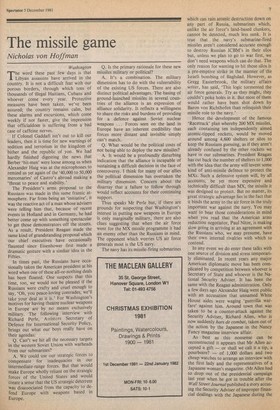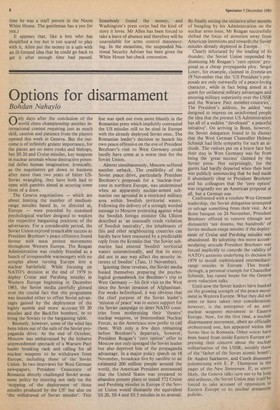The missile game
Nicholas von Hoffman
Washington rr he word these past few days is that Libyan assassins have arrived in the country. It is not a difficult feat with our porous borders, through which tens of thousands of illegal Haitians, Cubans and whoever come every year. Protective measures have been taken, we've been assured; the country remains calm, but these alarms and excursions, which come weekly if not faster, give the impression that officialdom is suffering from a bad case of caffeine nerves.
If Colonel Gaddafi isn't out to kill our leaders, then it is time for new warnings of sedition and terrorism in the kingdom of hither and the republic of yon. We had hardly finished digesting the news that Berber 'hit-men' were loose among us when Alexander Haig was at the microphones to remind us yet again of the '40,000 to 50,000 mercenaries' of Castro's abroad making a 'threat to peace and stability.'
The President's arms proposal to the Russians was made in this same frantic atmosphere. Far from being an 'initiative', it was the reactive act of a man whose advisers were telling him that, because of recent events in Holland and in Germany, he had better come up with something spectacular to get those demonstrators off the streets. As a result, President Reagan made the same kind of grandstanding proposal which our chief executives have occasionally flaunted since Eisenhower first made a dramatic gesture with a simliar idea in the Fifties.
In times past, the Russians have occasionally taken the American president at his word when one of these all-or-nothing deals has been floated. One suspects that this time, too, we would not be pleased if the Russians were crafty and cruel enough to say, 'Oh, you peace-loving comrades, we'll take your deal as it is.' For Washington's motives for having theatre nuclear weapons in Europe are by no means exclusively military. The following interview with Richard Perle, AF.sistv.rt Secretary of Defence for International Security Policy, brings out what our boys really have on their agendas: Q. Can't we hit all the necessary targets in the western Soviet Union with warheads from our submarines?
A. We could use our strategic forces to compensate for inadequacies in our intermediate-range forces. But that would make Europe wholly reliant on the strategic forces of the United States and would create a sense that the US strategic deterrent was disassociated from the capacity to defend Europe with weapons based in Europe. Q. Is the primary rationale for these new missiles military or political?
A. It's a combination. The military dimension has to do with the vulnerability of the existing US forces. There are also distinct political advantages. The basing of ground-launched missiles in several countries of the alliance is an expression of alliance solidarity. It reflects a willingness to share the risks and burdens of providing for a defence against Soviet nuclear weapons ... Forces seen on the land in Europe have an inherent credibility that forces more distant and invisible simply can't match.
Q. What would be the political costs of not being able to deploy the new missiles?
A. It would be a profoundly disturbing indication that the alliance is incapable of sustaining a difficult decision in the face of controversy. I think for many of our allies the political dimension has overtaken the military dimension. Concern about the disarray that a failure to follow through would reflect accounts for their continuing support.
Thus speaks Mr Perle but, if there are grounds for suspecting that Washington's interest in putting new weapons in Europe is only marginally military, there are also clues suggesting that when the air force went for the MX missile programme it had an enemy other than the Russians in mind. The opponent which worries US air force generals most is the US navy.
The navy has its missile-firing submarines which can rain atomic destruction down on any part of Russia, submarines which, unlike the air force's land-based clunkers, cannot be detected, much less sunk. It is true that the navy's submarine-fired missiles aren't considered accurate enough to destroy Russian ICBM's in their silos but, unless we plan to go to war first, we don't need weapons which can do that. The only reason for wanting to hit those silos is a pre-emptive strike in the manner of the Israeli bombing of Baghdad. However, as Gregg Easterbrook, the military affairs writer, has said, 'This logic tormented the air force generals. Try as they might, they couldn't poke holes in it. But most of them would rather have been shot down by Baron von Richthofen than relinquish their missile role to the navy.'
Hence the development of the famous 'Racetrack' plan whereby 200 MX missiles, each containing ten independently aimed atomic-tipped rockets, would be moved around among 4,600 shelters or silos to keep the Russians guessing, as if they aren't already confused by the other rockets we have in our submarines. President Reagan has cut back the number of shelters to 1,000 with the idea that the army will invent some kind of anti-missile defence to protect the MXs. Such a defensive system will, by all accounts, be yet more expensive and technically difficult than MX, the missile it was designed to protect. But no matter, its great strategic advantage lies in the fact that it binds the army to the air force in the truly important war against the navy. You may want to bear those considerations in mind when you read that the American arms reduction negotiator, Paul Nitze, is making slow going in arriving at an agreement with the Russians who, we may presume, have their own internal rivalries with which to contend.
In any event we do enter these talks with one source of division and stress temporarily eliminated. In recent years any major American diplomatic move has been complicated by competition between whoever is Secretary of State and whoever is the National Security Adviser. It has been the same with the Reagan administration. Only a few days ago Alexander Haig went public with an accusation that unnamed White House aides were waging 'guerrilla warfare' against him. Around town that was taken to be a counter-attack against the Security Adviser, Richard Allen, who is now suddenly hors de combat, taken out of the action by the Japanese in the Nancy Fancy magazine interview affair.
As best as this nonsense can be reconstructed it appears that Mr Allen accepted a gift — or shall we call it a tip, a pourboire? — of 1,000 dollars and two cheap watches to arrange an interview with the first lady and the representatives of a Japanese woman's magazine. (Mr Allen had to drop out of the presidential campaign last year when he got in trouble after the Wall Street Journal published a story accusing the Security Adviser of improper financial dealings with the Japanese during the time he was a staff person in the Nixon White House. The gentleman has a yen for yen.) It appears that, like a boy who has shoplifted a toy but is too scared to play with it, Allen put the money in a safe with an ill-formed idea that he could go back to get it after enough time had passed. Somebody found the money, and Washington's press corps had the kind of story it loves. Mr Allen has been forced to take a leave of absence and therefore will be unavailable for arms control manoeuvring. In the meantime, the suspended National Security Adviser has been given the White House hat-check concession.











































 Previous page
Previous page